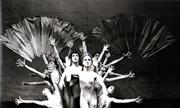Equus - Segal Centre of Arts
Often the best dramas come from real life stories. Playwright Peter Shaffer’s inspiration for Equus was just that.
Equus is based on a story of a Norfolk youth who allegedly blinded six racing horses with a metal spike. They were the only witnesses to his role in a clandestine sexual act performed in the stable.
Shaffer took the incident, added, subtracted and bent some of the original story and turned it into one of the most shocking contemporary stage dramas of the 20 century. Man’s love affair with the horse extends from time immemorial: The relationship between the two is tight. The horse has braved many battles with man, helped him pave pathways into new territories, pulled wagons across new frontiers, ploughed fields for crops. It has carried him through cities delivering important messages, “The British are coming”. King Richard, himself, cried “A horse, a horse, my kingdom for a horse”. It is no wonder that the bond between the two, once formed, is not easily broken.
Those relationships make for good story-telling. Remember the heart rending tale of Black Beauty? My Friend Flicka and The Yearling? This year’s Tony Awards saw War Horse, the story of a horse named Joey that is sold to the cavalry and shipped to France during WWI; receive best drama of the year. Put a horse in any story and it is a sure winner! But... a story about horses being brutally abused by a teen goes beyond the norm …that took courage and insight.
Equus won Shaffer the 1975 Tony Award for Best Play as well as the New York Drama Critics Circle Award. It was recently revived on Broadway with Daniel Radcliffe in the lead role of 17 year old Alan
Strang (2008-2009). That caused a bit of controversy because Radcliffe was still involved with the ever so popular Harry Potter series, and in the role of Strang, he was required to go nude on stage.
(Warner Bros was not pleased – His female fans were.) Perhaps the most remarkable thing about Equus is its relevance in today’s society: it is so many things to so many people. It encompasses
sexuality, religion and rituals, abuse of animals, and psychology. The inclusion of such a mélange of social perturbations promises a long life into the future for the play.
The plot of Equus focuses on Martin Dysart, a disillusioned middle-aged psychiatrist who is forced to confront his own deep-seated anxieties when he treats Strang, the young man who abused the
horses. Dysart searches for his own identity and sense of purpose in treating the boy. The playwright also digs in to the conflict between personal values, satisfaction and societal mores. The Segal
Centre, under its new management, minus Bryna Wasserman, is about to mount this tour de force that took London by storm when it surfaced at The Old Vic in 1973. The Segal project, though, was kick
started by Wasserman when she saw another play directed by Soffer in Tel Aviv. Starring Dan Jeannotte as Alan Strang and Jean Marchand as Dysart, Ellen David as Alan’s mother and Susan
Glover as the court magistrate, this promises to be a most riveting production.
The show is directed by Domy Reiter-Soffer who actually mounted a ballet version of Equus in 1980. This is the first time Soffer, who met Schaffer during the rehearsals of the ballet production, has directed the theatre production of Equus. His production of this Equus promises great impact and considerable insight. On at The Segal Centre from September 11 to October 2.
Blinded By Man
Enter Stage Left
By Sharman Yarnell
![/images/pictures/Sarah[1].jpg](/images/pictures/Sarah[1]_thumbnail.jpg)
